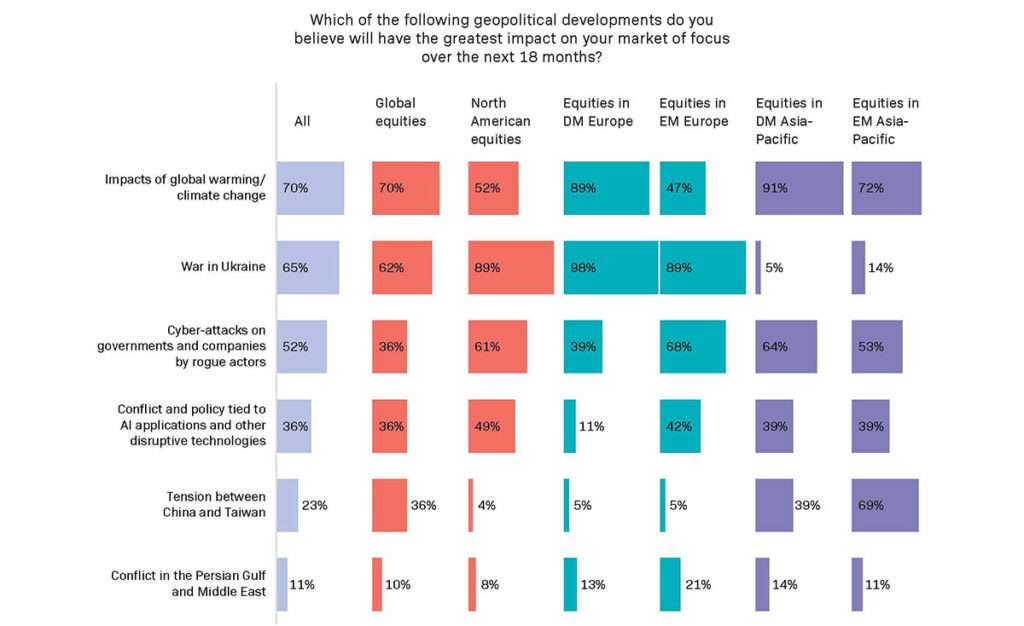Seeking opportunity in the climate concern divide
Are capital markets adequately factoring the impact of climate change to the value of securities? Many institutional investors do not think so.[1] And until markets rectify this anomaly, mispriced climate risks may present significant opportunities for savvy stock buyers.[2]
Investors believe climate change will be the most important geopolitical factor affecting equity prices over the next 18 months, according to a recent study based on the views of some 300 investment decision-makers from asset managers, foundations, pension schemes and endowments across the globe.
The timely report, produced by EquitiesFirst in collaboration with Institutional Investor’s Custom Research Lab, seeks to assess how persistent inflation, high interest rates, international conflict and pandemic recovery are influencing the near- and mid-term outlooks for global equity markets.
Asked what would have the greatest impact on stock markets over the next 18 months, 70% of respondents singled out climate change – ahead of war in Ukraine (65%) and cyber-attacks on governments and businesses (52%).
Varying climate concern
Investors’ views, however, diverged considerably depending on their regional equity remit. Those focused on developed markets in Europe and Asia Pacific were the most concerned about the impact of climate change.

By contrast, only around half of investors focused on North American equities saw climate change as a major risk, despite the increasingly destructive wildfires sweeping across the likes of California and Canada.
This lack of consensus around climate risk distorts equities valuations and may create an opportunity for equities investors to exploit.
Investors focused on North American markets might insufficiently discount stocks that would suffer most if a high carbon tax were imposed, or undervalue those that provide ways to reduce emissions.
That situation may be at least partly the result of US political pushback against investment that incorporates environmental, social and governance (ESG) factors. In fact, several of Wall Street’s largest financial institutions have warned that the backlash against ESG and, by extension, climate-related investment is now a material risk.[3]
In any case, most developed countries have pledged to reach net-zero emissions by 2050. To meet that target, there is still a very long way to go, so the chances are that more stringent climate regulations are coming. As a result, investors should consider the likely impact of current and expected climate policies on markets[4] – namely, which assets will suffer and which will benefit from such legislation.[5]
Reflecting on the opportunity
Investors focused on European developed-market stocks already seem to have nuanced views on the topic. Those interviewed for the study stressed that climate change and its impact were sources of both downside risk and upside opportunity because companies within their geographic purview were taking early and aggressive steps to transition to sustainable energy sources.
This not only makes companies in developed Europe more resilient to the imposition of more stringent climate regulation but could also give them a first-mover advantage as suppliers of products and services catering to an increasingly environmentally conscious global economy.
Meanwhile, the fact that investors focused on developed Asia showed a high level of climate concern – despite the region facing less stringent climate regulation and carbon pricing regimes than Europe – suggests equity valuations in those markets may already adequately reflect climate risks, including the likelihood that more onerous rules are on the way.
The concerns over climate risks in Asia’s developed markets are perhaps understandable, given that the impact of global warming on emerging Asia is likely to be more acute than in many other regions.
The investment opportunity offered by climate change is also particularly evident there. China dominates the solar panel supply chain globally and produces wind turbines at less than half the average cost internationally.[6] What’s more, the country continues to extend its lead in domestic renewable energy capacity, fuelling strong and steady growth in the sector.
Indonesia, meanwhile, exports vast quantities of nickel, cobalt and copper, largely for making electric vehicle batteries.
In fact, the worldwide push towards net-zero emissions will likely create opportunities in sectors and regions that investors may not yet even envisage.
Those wishing to get a piece of that action – whether for ethical reasons or monetary gain, or both – could consider tapping securities-backed financing. At a time of scarce liquidity, it can offer a more attractive way to raise capital for buying potentially undervalued stocks and diversifying portfolios without having to reduce exposure to other sectors and themes.
It may make sense to at least dip a toe into climate-related investment, as this is a theme that will continue to impact equity markets for a long time to come.
[1] https://kpmg.com/xx/en/home/insights/2021/10/can-capital-markets-save-the-planet.html
[2] https://assets.kpmg.com/content/dam/kpmg/ca/pdf/2022/02/do-asset-prices-fully-reflect-climate-risks-and-opportunities.pdf
[3] https://www.ft.com/content/f5fe15f8-3703-4df9-b203-b5d1dd01e3bc
[4] https://www.jpmorgan.com/wealth-management/wealth-partners/insights/climate-change-why-dont-the-markets-care
[5] https://www.unpri.org/inevitable-policy-response/what-is-the-inevitable-policy-response/4787.article#:~:text=IPR%20assesses%20that%20those%20policy,exposed%20to%20significant%20transition%20risk.
[6] https://www.spglobal.com/marketintelligence/en/news-insights/latest-news-headlines/china-s-increasingly-cheap-wind-turbines-could-open-new-markets-72152297
Are capital markets adequately factoring the impact of climate change to the value of securities? Many institutional investors do not think so.[1] And until markets rectify this anomaly, mispriced climate risks may present significant opportunities for savvy stock buyers.[2]
Investors believe climate change will be the most important geopolitical factor affecting equity prices over the next 18 months, according to a recent study based on the views of some 300 investment decision-makers from asset managers, foundations, pension schemes and endowments across the globe.
The timely report, produced by EquitiesFirst in collaboration with Institutional Investor’s Custom Research Lab, seeks to assess how persistent inflation, high interest rates, international conflict and pandemic recovery are influencing the near- and mid-term outlooks for global equity markets.
Asked what would have the greatest impact on stock markets over the next 18 months, 70% of respondents singled out climate change – ahead of war in Ukraine (65%) and cyber-attacks on governments and businesses (52%).
Varying climate concern
Investors’ views, however, diverged considerably depending on their regional equity remit. Those focused on developed markets in Europe and Asia Pacific were the most concerned about the impact of climate change.

By contrast, only around half of investors focused on North American equities saw climate change as a major risk, despite the increasingly destructive wildfires sweeping across the likes of California and Canada.
This lack of consensus around climate risk distorts equities valuations and may create an opportunity for equities investors to exploit.
Investors focused on North American markets might insufficiently discount stocks that would suffer most if a high carbon tax were imposed, or undervalue those that provide ways to reduce emissions.
That situation may be at least partly the result of US political pushback against investment that incorporates environmental, social and governance (ESG) factors. In fact, several of Wall Street’s largest financial institutions have warned that the backlash against ESG and, by extension, climate-related investment is now a material risk.[3]
In any case, most developed countries have pledged to reach net-zero emissions by 2050. To meet that target, there is still a very long way to go, so the chances are that more stringent climate regulations are coming. As a result, investors should consider the likely impact of current and expected climate policies on markets[4] – namely, which assets will suffer and which will benefit from such legislation.[5]
Reflecting on the opportunity
Investors focused on European developed-market stocks already seem to have nuanced views on the topic. Those interviewed for the study stressed that climate change and its impact were sources of both downside risk and upside opportunity because companies within their geographic purview were taking early and aggressive steps to transition to sustainable energy sources.
This not only makes companies in developed Europe more resilient to the imposition of more stringent climate regulation but could also give them a first-mover advantage as suppliers of products and services catering to an increasingly environmentally conscious global economy.
Meanwhile, the fact that investors focused on developed Asia showed a high level of climate concern – despite the region facing less stringent climate regulation and carbon pricing regimes than Europe – suggests equity valuations in those markets may already adequately reflect climate risks, including the likelihood that more onerous rules are on the way.
The concerns over climate risks in Asia’s developed markets are perhaps understandable, given that the impact of global warming on emerging Asia is likely to be more acute than in many other regions.
The investment opportunity offered by climate change is also particularly evident there. China dominates the solar panel supply chain globally and produces wind turbines at less than half the average cost internationally.[6] What’s more, the country continues to extend its lead in domestic renewable energy capacity, fuelling strong and steady growth in the sector.
Indonesia, meanwhile, exports vast quantities of nickel, cobalt and copper, largely for making electric vehicle batteries.
In fact, the worldwide push towards net-zero emissions will likely create opportunities in sectors and regions that investors may not yet even envisage.
Those wishing to get a piece of that action – whether for ethical reasons or monetary gain, or both – could consider tapping securities-backed financing. At a time of scarce liquidity, it can offer a more attractive way to raise capital for buying potentially undervalued stocks and diversifying portfolios without having to reduce exposure to other sectors and themes.
It may make sense to at least dip a toe into climate-related investment, as this is a theme that will continue to impact equity markets for a long time to come.
[1] https://kpmg.com/xx/en/home/insights/2021/10/can-capital-markets-save-the-planet.html
[2] https://assets.kpmg.com/content/dam/kpmg/ca/pdf/2022/02/do-asset-prices-fully-reflect-climate-risks-and-opportunities.pdf
[3] https://www.ft.com/content/f5fe15f8-3703-4df9-b203-b5d1dd01e3bc
[4] https://www.jpmorgan.com/wealth-management/wealth-partners/insights/climate-change-why-dont-the-markets-care
[5] https://www.unpri.org/inevitable-policy-response/what-is-the-inevitable-policy-response/4787.article#:~:text=IPR%20assesses%20that%20those%20policy,exposed%20to%20significant%20transition%20risk.
[6] https://www.spglobal.com/marketintelligence/en/news-insights/latest-news-headlines/china-s-increasingly-cheap-wind-turbines-could-open-new-markets-72152297
